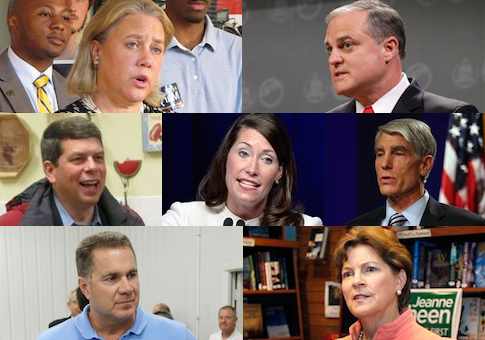Something peculiar has happened. As I write, none of the Republican candidates for Senate has become a public embarrassment. On the contrary: For the first time in a decade, it is the Democratic candidates, not the Republican ones, who are fodder for late-night comics. That the Democrats are committing gaffes and causing scandals at a higher rate than Republicans not only may be decisive in the battle for the Senate. It could signal a change in our politics at large.
Yes, at any given moment, one of the Republican candidates could say something stupid, could be revealed to be unethical, could act like an idiot. These are human beings we are talking about. There is a little more than two weeks to go before Election Day—plenty of time for Republicans to screw it up. But the fact that the GOP field has come so far without committing unforced errors is news in itself.
Since 2006, when Republican Senator George Allen of Virginia referred to an Indian-American Democratic tracker as "Macaca," GOP candidates have found ways to provoke, to offend, to annoy, to spawn unpleasant narratives, to let themselves become the story. In 2014, though, the Macaca moments aren't coming from Republicans. They are coming from Democrats.
In Montana, Senator John Walsh bowed out after he was exposed as a plagiarist. His replacement: avowed "punktuator" and socialist Amanda Curtis. In Kentucky, Alison Lundergan Grimes won’t reveal her presidential vote, citing—I am not making this up—the constitutional right to privacy (maybe what she had in mind was her Fifth Amendment right against self-incrimination). In Colorado, Mark Udall’s pro-abortion strategy is so tone-deaf, so extreme, that the press has dubbed him "Mark Uterus." In Louisiana, Mary Landrieu is saddled with charges of taking improper charter flights, and of claiming her parents' home as her own, raising questions of residency. In Arkansas, Mark Pryor couldn’t give an answer when a reporter asked if he approved of the president’s handling of the Ebola crisis. In Alaska, Mark Begich had to pull a scurrilous attack ad. In New Hampshire, Jeanne Shaheen is outraged by a Washington Free Beacon story revealing her involvement in a business that sold stolen goods.
Rep. Bruce Braley of Iowa is in a category all his own. His classless remark about longtime Senator Chuck Grassley being a farmer had such an impact that months later, when Braley said at a debate that his first call as senator would be to the Iowa Republican, the audience burst into laughter. Then there is the story of how Braley threatened a neighbor with a lawsuit over her pet chicken. It revealed him to the world as Congressman Schmuck.
The chicken is illustrative. It shows how candidate skills can be the key factor in a race. On one level, 2014 resembles 2010. The country is pretty much evenly divided between Democrats and Republicans. President Obama is unpopular, the economy is improving but only the rich are really feeling it, and Republicans have a lead in the generic ballot.
The difference? The Republican candidates are of much higher quality. After years of running Foleys and Akins, the GOP has marshaled an impressive slate of Senate prospects: McConnell, Gardner, Cassidy, Cotton, Sullivan, Brown, and Ernst have waged slick campaigns with few mistakes. In 2010, the Republicans fielded lightweights Sharron Angle and Ken Buck and "I’m Not a Witch" O’Donnell. It cost them the Senate. Chickens played a role in Sue Lowden losing the Republican Senate nod to Angle, helping deny the party Harry Reid's seat. Four years later, they may play a similar part in Bruce Braley's undoing.
Indeed, this year may be less like 2010 than 2006. The varnish of power, of legitimacy, of seriousness is wearing off the incumbent party. It is not only that we are in the sixth year of a two-term presidency. It is also because the grand dreams of the president's reelection—the major reforms, the gains in House and Senate seats, the talk of enduring majorities—are no longer tenable. The president’s approval rating is cratering; voter frustration and anger is mounting; the party of government is presiding over a time of government failure and malpractice.
The condition of the world and of America is awful and getting worse. Putin, Assad, the Islamic State, Ebola, Libya, child refugees on the border, war on the police in Ferguson, Iran, head-choppers in Oklahoma, market crash, the IRS, the VA, the DOJ—all this, and president is ready to amnesty illegal immigrants and empty Guantanamo Bay.
The liberal agenda is stagnant. Liberal discourse is insular, sophomoric, divorced from everyday life. What liberals say about race and gender and climate change is designed not to persuade the unconvinced but to rally the base. MSNBC is imploding. Vox.com is a laughingstock. The New Republic, now a hedge fund, is running articles calling for revolution against straight, white, and middle-class men. Have they looked at their masthead?
The Democrats are in danger of entering a period of caricature and jest similar to what the GOP has so long endured. The onset is sudden. One minute you are on top: proud, exultant, vindicated, and rather vindictive. You feel invincible. You can't lose.
Then, without warning, the wheel of fortune turns. Your armor of confidence is ripped away. Loss becomes not a possibility but a reality. A few moments ago you were boastful, demanding, serious. Now you are a joke. And once you become a joke, it is difficult to persuade others to stop laughing.
There is plenty of time for Republicans to have a Macaca moment. But right now, as of October 17, 2014, the Republican Senate candidates have performed better than they have in years. For the moment, today, as you read this, the Democratic candidates are the jokes.
Savor it.
